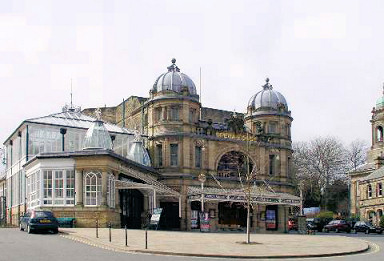|
Editor:
Marc Bridle
Webmaster: Len Mullenger
|
Seen and Heard Festival Preview Buxton
Festival 2006:
High Peak and High Culture. (BK)
Picture courtesy of Jim Redfern and nvmdigital.com
Designed by Frank Matcham, one of Britain's finest theatre architects at the time, Buxton Opera House ran as a successful theatre until 1927. Then it became a cinema where silent films were shown until 'talkies' took over in 1932. Later, when Lillian Bayliss, a woman of immense energy and vision, and manager of London's Old Vic, presented summer Festivals in Buxton in 1937 and 1939, the demand for live theatre re-awakened and continued during wartime, though sadly only for a further decade.
After intermittent use as a cinema once again, the Opera House fell into disuse until it was lovingly restored in 1979 following hard and dedicated work by local people. A further £1.9 million restoration in the late 1990's followed on to put the house at the centre of a remarkable success story: as the centrepiece for Buxton's summer music and arts festival.
Buxton Festival (see
website) has developed quickly into
one of Britain's largest opera-based festivals.
During the five year tenure of Artistic
Director Aidan Lang, audiences have trebled
to 35,000 in 2005 and the festival has grown
into an internationally recognised event.
At its core is a varied and innovative programme
of operatic rarities, which included Donizetti's
Maria Padilla in 2003 and Piazzolla's
Maria de Buenos Aires in 2005. This
year the festival runs from July 7th until
July 23rd and presents no less than eight
operatic works, ranging from Monteverdi
(The Coronation of Poppea) by way
of Gluck (Armide), Bizet (The
Fair Maid of Perth), Britten (Noye's
Fludde - already sold out) through to
Shostakovitch (The Nose) and a recent
work by Reading based composer Laurence
Roman (Isabella and the Pot of Basil.)
There are also two opera workshops
by Aidan Lang and the festival company.
No mean feat for a town of 25,000
inhabitants.
There's a varied Fringe
programme of small-scale drama, film and
comedy alongside the main Festival (See
Fringe web site) and an extensive Education
and Community programme. And if all that
isn't enough for you, immediately after
the festival ends there's an independent
Gilbert & Sullivan Festival (when
some people will attempt to sing all 13
operas in 29 hours for reasons best
known to themselves) between July 29th and
August 20th.
Back to the Top Back to the Index Page
|
| ||
|
||||




